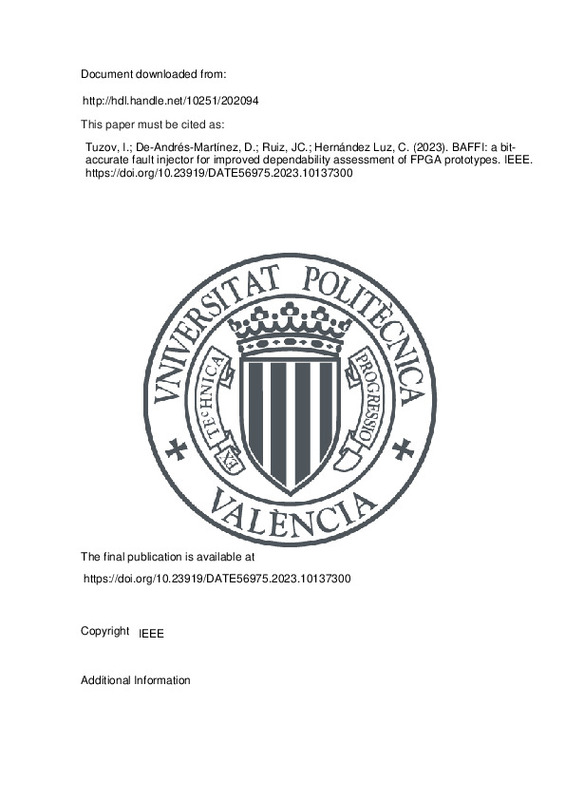Tuzov, I.; De-Andrés-Martínez, D.; Ruiz, JC.; Hernández Luz, C. (2023). BAFFI: a bit-accurate fault injector for improved dependability assessment of FPGA prototypes. IEEE. https://doi.org/10.23919/DATE56975.2023.10137300
Por favor, use este identificador para citar o enlazar este ítem: http://hdl.handle.net/10251/202094
|
Título:
|
BAFFI: a bit-accurate fault injector for improved dependability assessment of FPGA prototypes
|
|
Autor:
|

 Tuzov, Ilya
Tuzov, Ilya

 de-Andrés-Martínez, David
de-Andrés-Martínez, David

 Ruiz, Juan Carlos
Ruiz, Juan Carlos

 Hernández Luz, Carles
Hernández Luz, Carles
|
|
Entidad UPV:
|
Universitat Politècnica de València. Escola Tècnica Superior d'Enginyeria Informàtica
Universitat Politècnica de València. Departamento de Informática de Sistemas y Computadores - Departament d'Informàtica de Sistemes i Computadors
|
|
Fecha difusión:
|
|
|
Resumen:
|
[EN] FPGA-based fault injection (FFI) is an indispensable technique for verification and dependability assessment of FPGA designs and prototypes. Existing FFI tools make use of Xilinx essential bits technology to locate ...[+]
[EN] FPGA-based fault injection (FFI) is an indispensable technique for verification and dependability assessment of FPGA designs and prototypes. Existing FFI tools make use of Xilinx essential bits technology to locate the relevant fault targets in FPGA configuration memory (CM). Most FFI tools treat essential bits as black-box, while few of them are able to filter essential bits on the area basis in order to selectively target design components contained within the predefined Pblocks. This approach, however, remains insufficiently precise since the granularity of Pblocks in practice does not reach the smallest design components. This paper proposes an open-source FFI tool that enables much more fine-grained FFI experiments for Xilinx 7-series and Ultrascale+ FPGAs. By mapping the essential bits with the hierarchical netlist, it allows to precisely target any component in the design tree, up to an individual LUT or register, without the need for defining Pblocks (floorplanning). With minimal experimental effort it estimates the contribution of each DUT component into the resulting dependability features, and discovers weak points of the DUT. Through case studies we show how the proposed tool can be applied to different kinds of DUTs: from small-footprint microcontrollers, up to multicore RISC-V SoC. The correctness of FFI results is validated by means of RT-level and gate-level simulation-based fault injection.
[-]
|
|
Palabras clave:
|
Fault injection
,
FPGA
,
Configuration memory
,
Robustness assessment
,
RISC-V
|
|
Derechos de uso:
|
Reserva de todos los derechos
|
|
ISBN:
|
978-3-9819263-7-8
|
|
Fuente:
|
2023 Design, Automation & Test in Europe Conference & Exhibition (DATE). (issn:
1938-1891
)
|
|
DOI:
|
10.23919/DATE56975.2023.10137300
|
|
Editorial:
|
IEEE
|
|
Versión del editor:
|
https://doi.org/10.23919/DATE56975.2023.10137300
|
|
Título del congreso:
|
Design, Automation and Test in Europe Conference (DATE 2023)
|
|
Lugar del congreso:
|
Antwerp, Belgium
|
|
Fecha congreso:
|
Abril 17-19,2023
|
|
Código del Proyecto:
|
info:eu-repo/grantAgreement/AEI/Plan Estatal de Investigación Científica y Técnica y de Innovación 2017-2020/PCI2020-112092/ES/FRACTAL: A COGNITIVE FRACTAL AND SECURE EDGE-BASED ON A UNIQUE OPEN-SAFE-RELIABLE-LOW POWER HARDWARE PLATFORM NODE/
info:eu-repo/grantAgreement/AEI/Plan Estatal de Investigación Científica y Técnica y de Innovación 2017-2020/PID2020-120271RB-I00/ES/ACELERADORES BASADOS EN FPGAS PARA REDES NEURONALES PROFUNDAS SUFICIENTEMENTE CONFIABLES PARA SISTEMAS DE AUTOMOCION/
info:eu-repo/grantAgreement/EC/H2020/871467/EU/SELENE: Self-monitored Dependable platform for High-Performance Safety-Critical Systems/SELENE
info:eu-repo/grantAgreement/EC/H2020/877056/EU/A Cognitive Fractal and Secure EDGE based on an unique Open-Safe-Reliable-Low Power Hardware Platform Node/FRACTAL
info:eu-repo/grantAgreement/AEI//RYC2020-030685-I/ES/Designing High-Performance Processor for Safety Critical Applications
|
|
Agradecimientos:
|
This work has received funding from (i) ECSEL Joint Undertaking (JU) under grant agreement No 877056, (ii) Agencia
Estatal de Investigacion from Spain under grant agreement
no. PCI2020-112092, (iii) European Unions ...[+]
This work has received funding from (i) ECSEL Joint Undertaking (JU) under grant agreement No 877056, (ii) Agencia
Estatal de Investigacion from Spain under grant agreement
no. PCI2020-112092, (iii) European Unions Horizon 2020
research and innovation programme under grant agreement
no. 871467, and (iv) Grant PID2020-120271RB-I00 funded
by MCIN/AEI/ 10.13039/501100011033. Carles Hernandez is partially supported by Spanish Ministry of Science, Innovation
and Universities under Ramon y Cajal, fellowship No. RYC2020-030685-I.
[-]
|
|
Tipo:
|
Comunicación en congreso
Artículo
Capítulo de libro
|







![[Cerrado]](/themes/UPV/images/candado.png)


